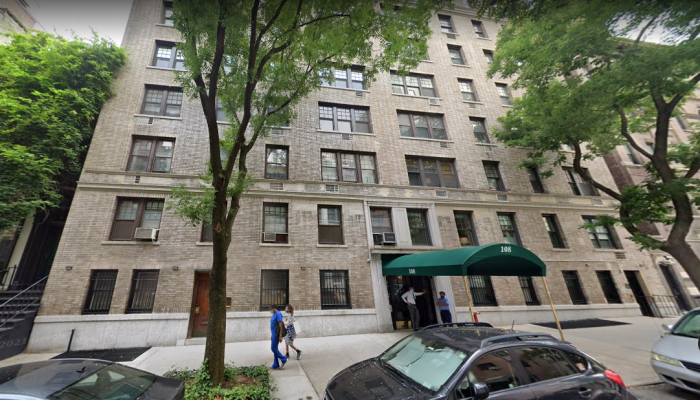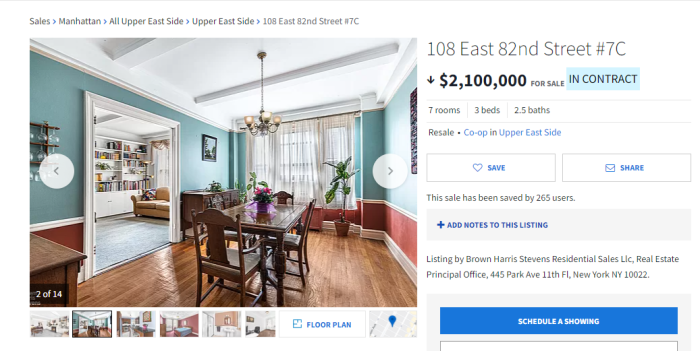Evangelical Lutheran Church sues pastor over sale of $2M NYC ‘parsonage’ apartment

NEW YORK — The Metropolitan New York Synod of the Evangelical Lutheran Church in America has sued one of its pastors for signing a contract to sell a $2 million Manhattan cooperative apartment he was given to use as a parsonage more than 30 years ago.
The synod is now asking the Supreme Court of New York to block a transfer of the title in that sale to prevent untold damage.
“Money damages alone will not repair the damage that would be done if defendants transfer title to the apartment,” the Synod argues in a complaint filed in the Supreme Court of New York on March 22.
Listed as defendants in the lawsuit are Pastor Gregory Fryer, the longtime leader of Immanuel Lutheran Church in New York City; the cooperative identified as East 82 Corporation; Douglas Elliman Property Management, the residential real estate firm; Brown Harris Stevens, and John Doe and Jane Doe.
The complaint contends that Fryer, who has been the pastor at Immanuel Lutheran Church since 1991, began living in the pre-war apartment, unit 7C at 108 East 82 Street on Manhattan’s Upper East Side, in 1993.
A real estate listing shows that the apartment has three bedrooms, 2.5 bathrooms, a formal dining room, “custom made built-in bookshelves, high beamed ceilings and pristine hardwood floors.”

The pet-friendly doorman building, which also features a planted roof deck, is located right off Park Avenue and blocks from the Metropolitan Museum of Art. The monthly maintenance is also almost $4,000.
It was argued in the complaint, however, that Fryer and Immanuel Lutheran Church broke a state law that requires the sale of religious properties to get a special approval to be valid. The complaint says that in 1993, East 82 Corporation issued stock certificate number 183 to Fryer, representing ownership of 220 shares of stock in the corporation and the proprietary lease for the apartment.
“Upon information and belief, defendants Fryer and Immanuel entered into an agreement for the title to the Apartment to be in the name of defendant Fryer, despite the fact that the real and beneficial owner of the Apartment is Immanuel and that upon the sale of the Apartment, part or all of the consideration for the sale would be given to Immanuel,” the complaint says.
“The Agreement was in violation of Religious Corporations Law § 12 and Not-for-Profit Corporation Law [sections] 511 and 511-a, which require that New York religious corporations seeking to sell, mortgage or lease for a term exceeding five years any of its real property must first receive the approval of the Attorney General or the New York State Supreme Court, and is void as against public policy.”
The synod notes that even if Fryer or Immanuel have sought approval for the sale under the law, “they cannot establish that the purposes of defendant Immanuel nor the interests of its members will be promoted by the sale, lease or exchange of the apartment.” The defendants say the suit also “cannot establish that the synod, the ecclesiastic governing body, has consented to the transaction.”
Representatives of Immanuel Lutheran Church were not immediately available for comment when contacted by The Christian Post Wednesday.
However, the synod led by Bishop Paul Egensteiner told CP in a statement: “In the State of New York, a religious organization may not sell, mortgage, or lease for five years or more any of their real estate unless they have obtained approval from the NYS Attorney General and (or) the NYS Supreme Court — a step that has not been undertaken.”
“Defendants Fryer and Immanuel have ignored and continue to act in defiance of the Religious Corporations and Not-for-Profit Corporation Laws, their own Constitution, their covenants with the Church and the Synod and their covenant with their members,” the complaint argues.
“Plaintiff, Synod, prays this Court: (a) issue a permanent injunction enjoining defendants Fryer and Immanuel from transferring title to the Apartment; and (b) issue an order for such other and further relief as this Court may deem just and proper.”




























